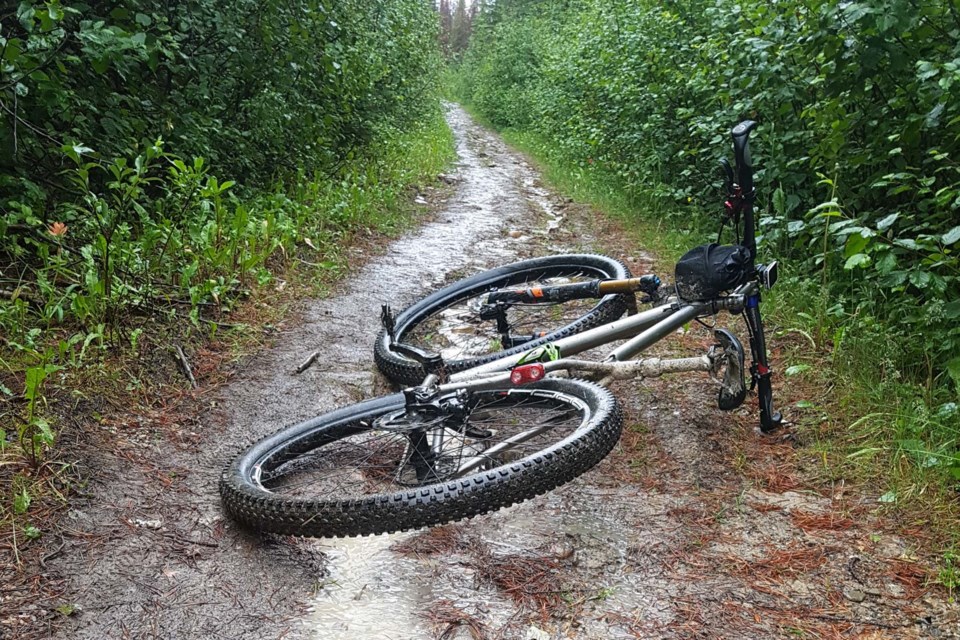If you can’t make it to Mount Everest, then bring Mount Everest to you.
That’s the general idea behind the Everesting challenge, which sees athletic enthusiasts take to their nearest local mountain or hill and bike up and down it enough times to match the equivalent height of Everest at 8,848 metres.
For St. Albert’s Dean Anderson, this particular challenge has been on his bike-it list for a few years. A recent family trip to Jasper National Park afforded him the chance to sneak off to Signal Mountain and ride the muddy mountain bike trail 11 times, a surface that he reviewed modestly as “tough.”
“The surface was pretty good for the first half. It was an eight kilometre long trail that climbed about 800-metres vertical elevation. That's about a 10 per cent grade, which is pretty steep,” he said.
“The first four kilometres was a pretty good surface; the trail was pretty well packed, and not a lot of loose rock or anything. But the upper four kilometres was pretty rough: a lot of big rocks, loose rock and gravelly stuff, a little bit of mud. A lot of stuff I had to manoeuvre around like a real mountain bike trail. That was pretty challenging to try to do that over and over again, and try to keep your momentum up to get over those steep, gravelly parts.”
Apart from that, he said it wasn’t actually that hard, even “fairly easy” as mountain bike trails go. He was also helped in that he was already pretty familiar with the Skyline Trail.
“There's a lot more difficult things you can ride on a mountain bike.”
The ride only took him 26 hours … straight.
The concept of Everesting was invented by a group of cyclists in Australia but has become a worldwide phenomenon. The premise is simple enough, though the practicality of it can present some extra challenges. You can take breaks but you can't sleep, for one thing. You have to do it in one continuous shot. You can also run instead of bike. Every accomplished Everesting challenge earns the participant a badge.
Anderson’s online tracking (found at everesting.cc) shows that he received two badges for this: one for his first Everesting success and another for doing it on soil. He should also have earned the Short badge for completing his ride in less than 200 km.
An interesting side note, he said, was that the only other Everesting success in Jasper Park was achieved by Ailsa MacDonald, an ultramarathoner who also lives in St. Albert. She biked up and down the trail at Whistler Skytram only a few days before Anderson did.
Anderson made sure to thank his wife, Kristin, for her support and encouragement. He also gave credit to Dale Marchand of Rollingdale Cycle for his custom-built single speed ride.
"It’s essentially a work of art. This thing is awesome. I got that built, and then at Cranky’s, they helped me out with the (30 x 28) gear ratio. I picked a forgiving gear ratio to try to get up the hill because I only have one gear. You want to pick something that you can actually maintain and finish the ride with. If it’s too hard, you'll burn out,” he said.
It’s the same bike that he used to cycle to work in the city on Monday too. For the keen cyclist, who has participated in personal and competitive two-wheeled challenges all across North America, the biggest battle was in the numbers game.
This became especially apparent when he was doing his training runs in St. Albert, practising by going up and down a short hill in Braeside. How short? It was so short that if he Everested it, it would have taken more than 600 loops.
“To do something hundreds of times is really tough. To do something where you can count it down from 11 down to 0 is less tough, even if it's long and it takes a long time. You're in the single digits of times to do over again, it mentally feels better.”
He did the Braeside hill close to 200 loops before he called it a day, or night. It was October and it was -5 C after dark, which made things less comfortable.
His next big bike ride will be Colorado Trail Race, the third race for him in the American Triple Crown of bikepacking. Before he tackles that one, his next real challenge is to recover from surgery to fix the anterior cruciate ligament in his left knee. He doesn’t have one, he says.
“My knee is unstable. It's OK for biking but I have issues with walking. It pops out every once in a while so I'm getting my ACL reconstructed this fall,” he said.




